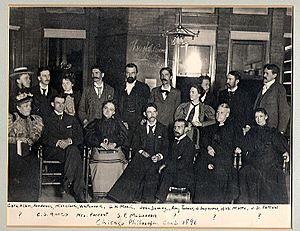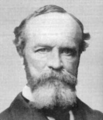Pragmatism facts for kids
Pragmatism is a way of thinking about ideas and knowledge that started in the United States around 1870. It's a philosophy that believes the best way to understand something is by looking at its practical results. Instead of just thinking about what something means, pragmatists ask: "What does it do? How does it work in the real world?"
This idea suggests that our thoughts and words are like tools. We use them to solve problems, make predictions, and take action. Pragmatism does not believe that thinking is just about describing or mirroring reality. Instead, it sees thinking as a way to interact with and change the world around us.
Contents
What is Pragmatism?
Pragmatism focuses on the practical side of ideas. It says that the true meaning of an idea comes from its real-world effects. If an idea doesn't have any practical results, then it might not be very useful or meaningful.
Ideas as Tools
Imagine your ideas are like tools in a toolbox. You wouldn't just look at a hammer and think about what it "is." You'd think about what it "does"—it hammers nails. In the same way, pragmatists believe we should look at ideas based on what they help us achieve.
Testing Ideas in Real Life
Pragmatism encourages us to test our ideas by acting on them. It's like doing an experiment. If an idea works well and helps us solve a problem, then it's a good idea. If it doesn't work, then we should change or get rid of it. This means that knowledge is always changing and improving as we learn more from our experiences.
Who Started Pragmatism?
The beginnings of pragmatism are often linked to three important American thinkers. They were Charles Sanders Peirce, William James, and John Dewey.
Charles Sanders Peirce
Charles Sanders Peirce was a brilliant thinker who first came up with the idea of pragmatism. He said that to understand an idea, we should think about all the practical effects it might have. Our understanding of those effects is our complete understanding of the idea itself.
William James
William James helped make pragmatism famous. He wrote a lot about how our beliefs and ideas affect our lives. He believed that if a belief helps us live better lives, then it has value and meaning.
John Dewey
John Dewey was another key figure. He applied pragmatism to many areas, especially education and democracy. He believed that learning should be an active process where students solve problems and learn by doing.
Why is Pragmatism Important?
Pragmatism is important because it changes how we think about truth and knowledge. Instead of seeing truth as something fixed and unchanging, pragmatists see it as something that grows and develops.
Focus on Change
Pragmatism believes that the universe is always changing. This is different from older philosophies that thought reality was unchanging. Because things are always changing, our ideas and knowledge must also be flexible and able to adapt.
Solving Problems
This philosophy is very useful for solving real-world problems. It encourages us to look for solutions that actually work, rather than just sticking to old ideas that might not be helpful anymore. It's about finding what is useful and effective in our daily lives.
Related pages
Images for kids
-
Charles Peirce: the American polymath who first identified pragmatism
See also
 In Spanish: Pragmatismo para niños
In Spanish: Pragmatismo para niños





